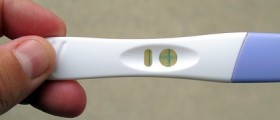Introduction
One in five pregnancies in women will result in a spontaneous miscarriage during their child-bearing years and this occurs randomly and at no fault of the involved individual. It is such a common occurrence that doctors don't regard a single miscarriage as a pathological problem, the cause of which needs no further investigating.
Causes of miscarriages
Abnormal chromosomes or genes
Most miscarriages occur because the fetus isn't developing normally. Around half of the miscarriages are associated with missing or extra chromosomes and occur as a result of errors that take place when the embryo is dividing and developing and doesn't have to do with the genes inherited from the parents.

These chromosomal abnormalities can cause the following issues:
- A blighted ovum - where no embryo forms.
- Molar pregnancy - where both sets of chromosomes come from the father.
- Intrauterine fetal demise - the embryo forms but stops developing and dies before any symptoms and signs of pregnancy loss can occur.
Maternal health issues
In some cases, health conditions affecting the mother can lead to miscarriages. These may include:
- Infections.
- Uncontrolled diabetes.
- Thyroid diseases.
- Problems affecting the uterus and/or cervix.
Progesterone supplementation
One of the main causes of miscarriages is an inadequate production of progesterone during the second half of the menstrual cycle after ovulation. This is the part of the cycle where progesterone levels would increase to make the uterus more viable for implantation of the fertilized egg (embryo).
For more than 50 years now, progesterone supplements have been recommended for women who have been struggling to conceive but there hasn't been a lot of research on how it can benefit those women who get pregnant but then have a miscarriage.
The conclusion was that progesterone supplementation is a safe and relatively inexpensive treatment for preventing miscarriages in women who previously experienced recurrent or multiple miscarriages. Further research needs to be performed to validate the findings made by the study though.
How does it work?
The function of progesterone is to stabilize the endometrium (inner lining of the uterus) so that the embryo has an adequate area to implant on and develop further.
Women who have had recurrent miscarriages are advised to speak to their doctors about the possible use of progesterone supplementation to aid in carrying a pregnancy to term.
- www.fertstert.org/article/S0015-0282(16)63029-7/fulltext
- Photo courtesy of SteadyHealth



-Why-Some-Women-Take-This-Type-Of-Progesterone-During-Early-Pregnancy_f_280x120.jpg)












